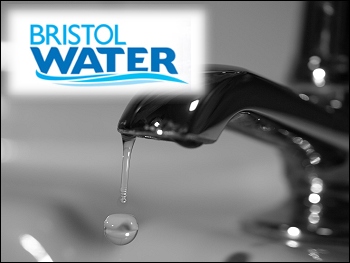Burnham-On-Sea residents have this week been assured by Bristol Water that the town’s tap water is safe despite concerns about a ‘bleachy tang’ being noticed in recent days.
The company responded after several concerns were raised on Burnham-On-Sea.com’s forums here.
Spokeswoman Alison Jennings told Burnham-On-Sea.com on Friday: “Burnham is supplied by our Treatment Works at Cheddar. Good quality water from local springs is collected at Cheddar Gorge and in turn is pumped to Cheddar raw water storage reservoir.”
“Chlorine is added as a gas at a fixed dose during the final stages of treatment to maintain excellent bacteriological purity as the water moves through the network. Whilst the water is in transit the chlorine gas will gradually escape from the water and the level of chlorine present will reduce. We need to add sufficient chlorine so that customers at the furthest ends of the network receive approximately 0.1mg/l at their tap.”
She added: “If you find the taste of chlorine unpalatable you could try filling a bottle of water and leave it in the fridge overnight to allow the gas to escape.”
“Occasionally we get burst mains on the system which require quick repair to ensure customers are kept in water. If we replace a section of pipe it will need to be disinfected using chlorine before it is used to carry water. Some customers may notice a slightly increased level of chlorine after a repair, but given the high dilution factor in the network a customer would need to be relatively close to the repair to notice the elevated level.”
“If you notice a burnt plastic/metallic/medicinal type taste to the water this is normally a consequence of the chlorine reacting with plastic and rubber pipe work and fittings within your property.”
“This is more likely to occur in winter as there is more chlorine around due to the cold water temperature holding the gas in the water for longer. Taste issues are usually associated with the formation of tri-chlorinated phenols (TCP, like the antiseptic ointment) and although can taste very unpleasant are harmless at the level found in domestic plumbing systems.”
“The taste is more profound when the water is boiled and can ruin a cup of tea. Hoses which connect washing machines and dishwashers to the cold water supply are quite often the main cause. Water can sit in the hose and react with the rubber producing these compounds. When the tap is turned on some of this water can syphon back from the hose and comes out of the tap.”
“To prevent this from happening we recommend you fit a non-return valve at the point where the hose joins the copper pipe work under your sink. Some other culprits include plastic kettles, rubber tap washers and flexible pipe work used to connect taps onto copper pipe work.”
She added: “We add between 0.65 and 0.95mg/l at the outlet of Cheddar Treatment Works. The amount of chlorine in the water may fluctuate when out in the network depending on water temperature – if the water is cold, like now, the gas is held in the water for longer and will be more noticeable; and also demand for water – in times of high demand, particularly morning and/or afternoon, the water is moving through the network quicker and the gas will have less chance to escape before it reaches you.”
“We monitor the chlorine level and other water quality parameters at Cheddar Treatment Works using very sophisticated analytical instruments and should the level of chlorine vary beyond specific limits that we set the Treatment Works will shutdown to prevent out of specification water entering the distribution system.”
“The water from Cheddar Treatment Works is pumped to Brent Knoll Service Reservoir where we also have a booster chlorination pump set. We have the facility to add additional chlorine to ensure the residual is maintained in the network and again this is controlled to ensure the chlorine level is maintained within set limits between 0.3 and 0.7 mg/l. Please be assured that we are always looking to optimise the level of chlorine in your drinking water and you will notice some seasonal variations.”







